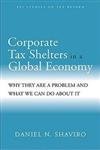Tax Scam Alert On Corporate America

There is more than $1 trillion worth of profits earned by US multinationals stashed in overseas subsidiaries. Our tax system is set up so that as long as that money remains off-shore, the corporations who own it, will not pay any taxes on it. By maintaining such a tax code, we are literally encouraging companies to create jobs and profits in countries other than our own.
Now, some of the companies doing the stashing, say they are willing to bring a big pile of the cash home, and the only thing they are asking for in return, is a temporary tax break they claim won't cost the US Treasury a penny. It won't cost anything, they claim, because it's money that wouldn't be coming home at all, therefore it wouldn't be subjected to any tax. They also assert that the tax break will raise billions of dollars ($50 billion, to be exact) by applying the reduced tax rate to the money that's repatriated. Without a tax break, at 35%, the tax revenue would be $350 billion. Of course, in order to get that tax revenue, corporations would have to be honest about their earnings and where they are earning them.
The companies involved, Cisco Systems, Adobe, Apple, CA Technologies, Duke Energy, Google, Microsoft, Oracle, Pfizer, and Qualcomm, to name a few, are powerful in their own right, and the list is growing. They are seeking fundamental changes in the tax code, but if they can't get them immediately, they'll settle for a tax “holiday.”
The proposal has been kept relatively quiet, but is aimed at romancing those who might be sensitive to voters' anti-business sentiments just prior to an important election year. The argument is that a tax break of this magnitude will bring a flood of cash into the US, to be spent on domestic investment and job creation. The coalition pushing for the tax holiday insists there should be no conditions on how the repatriated money should be used, and argues that the repatriation may create as many as 2 million jobs.
There is one glaring problem with the idea. An almost identical holiday was passed by Congress in 2004, and used mostly in 2005. It did very little to boost jobs or investments according to several economic studies. However, it went a long way in lining the pockets of corporate executives and shareholders.
In April 2009, University of Kansas researchers released a report showing the $220 tax savings for every $1 spent lobbying for the break. Corporate lobbyists presented a goal of using the savings to invest in domestic productions. A snowed Congress bought it, thus granting the tax holiday.
Analysts at the National Bureau of Economic Research checked out just what the corporations actually spent the money on, and discovered that domestic investment hadn't been one of the top priorities. According to confidential government data and corporate reports, of the $299 billion brought back from foreign subsidiaries, roughly 92% went to shareholders, mostly in the form of increased share buybacks and increased dividends. Absolutely no evidence can be found to support the notion that companies who took advantage of the tax break truly used the money as was expected by Congress.
Even more interesting is the fact that the law passed specifically stated the money could not be used to raise dividends or buyback shares. Kristin J. Forbes, an economics professor at the Massachusetts Institute of Technology and one of the study's authors, used Dell as an example. The company had lobbied hard for the tax break. They had promised that part of the money would be brought back into the country for the purpose of building a new plant in Winston-Salem, N.C. They brought $4 billion back, spent $100 million on the plant, and used $2 billion for a share buyback. They later admitted that the plant would have been built anyway.
In the spring of 2009, the Obama Administration announced “a major offensive against businesses and wealthy individuals who avoid US taxes by parking cash overseas.” The plan is to prevent corporations from claiming tax deductions on overseas investments until they pay US taxes on the profits, and disallow companies to move income into tax havens like the Cayman Islands. There is nothing outlandish or unfair about such a plan.
The small business owner who files his taxes each year, has the same restraints placed on him. He can claim all legitimate expenses associated with earning gross revenue, subtract it from the gross figure and only pay tax on the profit. If he earned business income in two different states, he would pay taxes in each state based on the income earned in that state, minus the expenses incurred in that state. He would not be able to shelter the income earned in one state, while passing the expenses on to the earnings made in the other state.
Seagate Technology is the world's largest producer of hard disk drives. It is headquartered in Scotts Valley, California, though the documents filed with the Securities and Exchange Commission list an address on South Church Street, George Town, capital of the Cayman Islands. In fact, 18,857 Cayman Corporations use that very same address, including Coca-Cola Co, Oracle Corp, Altria Group Inc, and Tyco International, Ltd, to name just a few. It is a five-story office building called Ugland House. Roughly half of those Cayman Corporations had US billing addresses as of 2008.

Can you say tax scam?
The obvious evidence that companies are scamming the tax system is that the reported overseas earnings have grown faster than the overseas sales. I'm not sure how that's done. How do you sell two objects for a dollar and end up with $4? US pharmaceutical companies reported 80% of their pretax profits overseas in 2008. Those companies' foreign sales only grew from 38% of revenue to 52% during that period.
In February of this year, Cisco's chief executive officer, John T. Chambers, told securities analysts that “I think this one has well over a 60 percent probability of being resolved in a positive way,” meaning the demand for a ridiculously low tax rate in exchange for repatriation. He may be right, even though studies have given overwhelming evidence of the past repatriation's failure to increase domestic investment, employment or research and development. It DID manage to boost share buybacks for the corporations.
It's the success of such tax avoiding strategies responsible for motivating this push for a new tax holiday. US multinationals have more wealth overseas than they can use, but if it's brought home they'll be forced to pay the difference between the extremely low rate paid abroad and the the US tax rate of 35%. In 2005, the special tax rate of 5.25% was further reduced by tax planning strategies that helped lower the average tax on repatriated funds to a mere 3.7%.
One way this demand will certainly get met is if the lid can be kept on it. Those lobbying for the tax holiday have been careful not to make too much noise that would gain the attention of voters, who will definitely have more pull with their government officials given the climate of dissatisfaction. As always, the more noise and attention drawn to this issue, the more roadblocks can be created against it becoming a reality.
If you found this information helpful, please pass it on by clicking the Tweet, Like, or +1 button provided at the top of the page.
- Outsourcing The American Dream
Unemployment is rising despite government's attempt at reworking the numbers to exclude those whose benefits have run out. The fact remains that the United States has been bleeding hundreds of thousands of jobs. The culprit? American Corporations hun - Middle Aged Americans Are Losing Their Quality Of Life
Middle Aged Americans Are Losing Their Quality of Life chronicles a dozen years in the life of one middle aged woman. Within the contents is shown how the economy has taken its toll, creating a situation where two full time jobs are required to barel - American Corporations: The New Slave Masters
Corporations crying over the high tax rates levied against them, have continued to move American jobs overseas. The question begs to be asked whether a 30% foreign tax rate truly makes the difference over the 35% American rate, or if the true lure is - Has The Socialist Agenda Taken Over Our Schools?
John Dewey and William Kilpatrick were strong advocates for changing the way American students were taught. Did changes in methodology and content beginning in the 1920's contribute to a nation full of under educated graduates? Have so called new met









